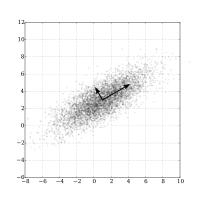
Photo from wikipedia
Summary Reduced order models are useful for accelerating simulations in many-query contexts, such as optimization, uncertainty quantification, and sensitivity analysis. However, offline training of reduced order models (ROMs) can have… Click to show full abstract
Summary Reduced order models are useful for accelerating simulations in many-query contexts, such as optimization, uncertainty quantification, and sensitivity analysis. However, offline training of reduced order models (ROMs) can have prohibitively expensive memory and floating-point operation costs in high-performance computing applications, where memory per core is limited. To overcome this limitation for proper orthogonal decomposition, we propose a novel adaptive selection method for snapshots in time that limits offline training costs by selecting snapshots according an error control mechanism similar to that found in adaptive time-stepping ordinary differential equation solvers. The error estimator used in this work is related to theory bounding the approximation error in time of proper orthogonal decomposition-based ROMs, and memory usage is minimized by computing the singular value decomposition using a single-pass incremental algorithm. Results for a viscous Burgers' test problem demonstrate convergence in the limit as the algorithm error tolerances go to zero; in this limit, the full-order model is recovered to within discretization error. A parallel version of the resulting method can be used on supercomputers to generate proper orthogonal decomposition-based ROMs, or as a subroutine within hyperreduction algorithms that require taking snapshots in time, or within greedy algorithms for sampling parameter space. Copyright © 2016 John Wiley & Sons, Ltd.
Journal Title: International Journal for Numerical Methods in Engineering
Year Published: 2017
Link to full text (if available)
Share on Social Media: Sign Up to like & get
recommendations!